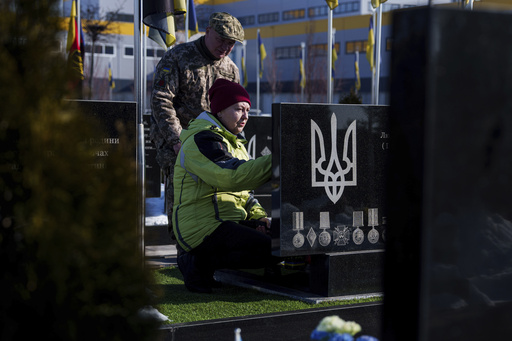KYIV, Ukraine — On Monday, Ukraine commemorated a somber third anniversary of its ongoing conflict with Russia. The Ukrainian forces are facing immense challenges on the frontlines, and a notable shift in U.S. foreign policy towards the Kremlin has emerged under the Trump administration. This profound change draws concern amidst ongoing battlefield pressures.
This milestone occasion saw over a dozen Western leaders gather in Kyiv to express solidarity with Ukraine. They emphasized the conflict’s far-reaching consequences for international security and pledged continued financial support amounting to billions of dollars for Ukraine, even as doubts grow regarding U.S. dedication to aid. Notably, no senior U.S. government officials were present at the commemorative event. The upcoming year in this conflict may prove crucial, particularly as Trump takes steps to negotiate a peace deal upon his return to office.
European Commission President Ursula von der Leyen cautioned that global security hinges on how negotiations regarding the conclusion of the war unfold. She stated, “The autocrats around the world are watching very carefully whether there’s any impunity if you violate international borders or invade your neighbor, or if there is true deterrence.” Canadian Prime Minister Justin Trudeau supported this, indicating that the stakes extend beyond Ukraine. “Canadians, he said, ‘believe deeply that it’s not just about Ukraine. It’s about the rules and the values and the principles of sovereignty, of independence, territorial integrity that protects every country in the world. All of us rely on those rules to be able to build peace and security.’”
Several analysts warn that Russian gains in Ukraine could encourage China’s regional ambitions. Similar to Russia’s assertions about Ukraine’s territory, China maintains claims over Taiwan. Additionally, states such as North Korea and Iran have provided support to Russia during the ongoing conflict. In a disheartening turn for Ukraine, Trump has labeled Ukrainian President Volodymyr Zelenskyy a dictator, shifted blame onto Ukraine for the conflict, and taken steps to end the diplomatic isolation that Putin faced for nearly three years. Furthermore, discussions among U.S. officials suggest that Ukraine’s aspirations to join NATO may not materialize and that the return of territories occupied by Russia is becoming increasingly unlikely.
While the Ukrainian military encounters shortages of personnel and arms, Russian forces appear to be gaining ground on the battlefield. The leaders who visited Kyiv and participated via video conference echoed similar sentiments: Ukraine and its allies in Europe must play a key role in any forthcoming peace negotiations, and the ambitions of Putin need to be curbed. There is also a growing call for Europe to shoulder more responsibilities concerning its security.
Many European nations are apprehensive following the shift in U.S. policy, fearing they may be excluded from discussions aimed at establishing a peace agreement. In light of potential reductions in U.S. financial assistance for Ukraine, European leaders are deliberating how they might maintain support for Kyiv. The altered stance from Washington is causing strains in transatlantic relationships. In response, European Council President Antonio Costa announced plans for an emergency summit of EU leaders on March 6, 2024, with discussions centered on Ukraine.
In a significant move, EU foreign ministers recently approved new sanctions targeting Russia, aimed specifically at its “shadow fleet” used for transporting oil and gas while bypassing restrictions, as well as several companies engaged in aiding Russian military efforts. The sanctions are intended to hamper Russia’s military supply chains and have also been complemented by the United Kingdom, which announced a major sanctions initiative affecting over 100 businesses and individuals associated with the conflict.
Spanish Prime Minister Pedro Sánchez pledged to contribute a military systems package worth 1 billion euros to Ukraine this year. British opposition leader Keir Starmer emphasized that Ukraine’s voices should be fundamental in the pursuit of peace, asserting, “Russia does not hold all the cards in this war.” In conjunction with a recent electoral victory in Germany, conservative leader Friedrich Merz echoed the sentiment that Ukraine must be supported and included in peace arrangements.
In an alarming development over the weekend, Russia launched its largest drone assault of the war thus far, deploying 267 drones against Ukraine. The EU’s lead diplomat, Kaja Kallas, stressed that no peace resolution could be effectively brokered without the involvement of Ukraine and Europe. She criticized the recent pro-Russian stances emerging from the Trump administration, emphasizing the necessity of mutual agreement in any discussions concerning Ukraine’s future.
As U.N. Secretary-General António Guterres remarked, the third anniversary of the conflict is a “grim milestone,” pointing to the loss of over 12,600 civilian lives and the severe destruction of infrastructure. Both Washington and Moscow are reportedly rekindling diplomatic connections, with discussions of a potential meeting between Trump and Putin taking place. Zelenskyy conveyed concerns during a recent virtual summit with G7 leaders, underscoring the urgent need for assurances of continued American support. “And, President Trump, we would really like to hear from you because all our people, all our families, are very worried. Will there be support from America? Will America be the leader of the free world?” Zelenskyy expressed.
